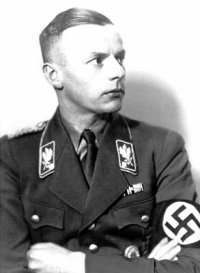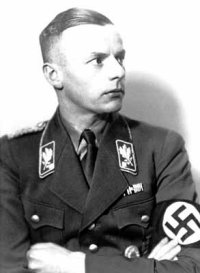Fought in World War One.
Member of the SA and the SS.
Between 1939 and 1943 he was SS and Police Leader in the General Government in German-occupied Poland before being replaced by Wilhelm Koppe.
Committed suicide on May 9th, 1945 (a day after the war in Europe ended) to aviod capture by the Allies.∼Nazi official and high-ranking member of the SA and SS. Between 1939 and 1943 he was Higher SS and Police Leader in the General Government in German-occupied Poland and in that capacity he organized and supervised numerous acts of war crimes and had a major responsibility for the Holocaust.
Krüger was born into a military family in Strassburg, Alsace-Lorraine, Germany (nowadays in France) in 1894; he received elementary school education, but ultimately left school before graduating to begin a military career as a cadet in military schools in Karlsruhe and Gross-Lichterfelde. In June 1914, Krüger was commissioned a second lieutenant in the German Army when World War I broke out. During the course of the war, he was wounded three times and awarded the 1st and 2nd class Iron Crosses. After the war, Krüger first joined a naval brigade; in August 1919, he became a member of the Freikorps von Lützow, which he left again in March 1920. Returning to civil employment, he worked as a clerk in Berlin until 1923, then assumed another position as the director of the Berlin's refuse company (Bemag) in 1924. He stayed in that position until 1928, then left the company and began a career as a self-employed entrepreneur. Krüger married in 1922; he and his wife had two children, and adopted three foster children.
While working at the refuse company, he probably also met Kurt Daluege for the first time. Daluege was an engineer at the company at that time who later on became SS commander in Berlin and leader of the Ordnungspolizei ("order police") or Orpo. The two men soon formed a friendship. In November 1929, Krüger joined the NSDAP (as member 171199) ; in February 1931, he also joined the SS (6123), which he left again abruptly in April to transfer to the SA. With the help of Daluege, Krüger instantly acquired the SA rank and the power necessary to conduct reforms of the SA Formation East. He was promoted to SA-Gruppenführer (equivalent to major-general) in 1932 and joined Ernst Röhm's personal staff.
In June 1933, Krüger was promoted again to SA-Obergruppenführer and appointed chief of the Ausbildungswesen ("training", AW). Cooperating closely with the Reichswehr, he used his new position to school the SA's best recruits (an estimated 250,000) to become officers. Krüger was not caught in the Night of the Long Knives, in which Röhm and many other high-ranking SA members were killed, and it has been speculated that his switch from the SS to the SA was only for pragmatic reasons, especially in the light of Krüger transferring the SA armouries of which he was in charge to the Reichswehr as soon as the purge began. Nevertheless, Krüger was left without a job temporarily, until he re-entered the SS while still keeping his SA rank.
In 1935, Krüger was appointed SS-Oberabschnittsführer. On 21 February 1936, he was appointed inspector of border guard units as well as Adolf Hitler's personal representative at a variety of formal and informal NSDAP events. Krüger enjoyed continued promotions as a result of his loyalty to the Nazi Party as well as his military, police and administration skills.
On 4 October 1939, because of his ambition and his loyalty to the party, Heinrich Himmler, appointed him to act as Higher SS and Police Leader (HSSPF East) (Höherer SS- und Polizeiführer) in the part of German-occupied Poland called the General Government. Krüger thus became one of the most powerful men in occupied Poland. Among other things he was responsible for: crushing rebellion in the extermination camps, setting up forced labour camps, the employment of police and SS in the evacuations of people from Warsaw ghettos, the execution of Aktion Erntefest, the so-called "anti-partisan" fighting in the General Government, and the driving out of over 1,000,000 Polish farmers from the area around Zamość. Authority quarrels with governor general Hans Frank led to his dismissal on 9 November 1943. He was replaced by Wilhelm Koppe. The Polish Secret State ordered his death, but an assassination attempt on 20 April 1943 in Kraków failed when two bombs hurled at his car missed the target. Six months later, he wrote in a letter, "I have lost honour and reputation due to my four year struggle in the GG (General Government) (Ich habe für meinen vierjährigen Kampf im GG Ehre und Reputation verloren).
From November 1943 until April 1944 Krüger served with the 7th SS mountain infantry "Prince Eugen" division in Nazi-occupied Yugoslavia. While ostensibly engaged in anti-partisan actions in Yugoslavia, this unit became notorious for committing atrocities against the civilian population.
Later from June to August Krüger took over the command over the 6th SS Mountain Division Nord in northern Finland. From August 1944 until February 1945 Krüger was commanding general of the 5th SS Mountain Infantry Corps. In February 1945 he was Himmler's representative at the German southeast front and in April and May 1945 he was commander of a combat unit of the Ordnungspolizei (Orpo) at Army Group South (known as Army Group Ostmark after 1 May 1945). At the end of the war Krüger committed suicide in upper Austria.
Gen. Kruger was portrayed by Danish actor Jesper Christiansen in the 2001 movie 'Uprising'.
Fought in World War One.
Member of the SA and the SS.
Between 1939 and 1943 he was SS and Police Leader in the General Government in German-occupied Poland before being replaced by Wilhelm Koppe.
Committed suicide on May 9th, 1945 (a day after the war in Europe ended) to aviod capture by the Allies.∼Nazi official and high-ranking member of the SA and SS. Between 1939 and 1943 he was Higher SS and Police Leader in the General Government in German-occupied Poland and in that capacity he organized and supervised numerous acts of war crimes and had a major responsibility for the Holocaust.
Krüger was born into a military family in Strassburg, Alsace-Lorraine, Germany (nowadays in France) in 1894; he received elementary school education, but ultimately left school before graduating to begin a military career as a cadet in military schools in Karlsruhe and Gross-Lichterfelde. In June 1914, Krüger was commissioned a second lieutenant in the German Army when World War I broke out. During the course of the war, he was wounded three times and awarded the 1st and 2nd class Iron Crosses. After the war, Krüger first joined a naval brigade; in August 1919, he became a member of the Freikorps von Lützow, which he left again in March 1920. Returning to civil employment, he worked as a clerk in Berlin until 1923, then assumed another position as the director of the Berlin's refuse company (Bemag) in 1924. He stayed in that position until 1928, then left the company and began a career as a self-employed entrepreneur. Krüger married in 1922; he and his wife had two children, and adopted three foster children.
While working at the refuse company, he probably also met Kurt Daluege for the first time. Daluege was an engineer at the company at that time who later on became SS commander in Berlin and leader of the Ordnungspolizei ("order police") or Orpo. The two men soon formed a friendship. In November 1929, Krüger joined the NSDAP (as member 171199) ; in February 1931, he also joined the SS (6123), which he left again abruptly in April to transfer to the SA. With the help of Daluege, Krüger instantly acquired the SA rank and the power necessary to conduct reforms of the SA Formation East. He was promoted to SA-Gruppenführer (equivalent to major-general) in 1932 and joined Ernst Röhm's personal staff.
In June 1933, Krüger was promoted again to SA-Obergruppenführer and appointed chief of the Ausbildungswesen ("training", AW). Cooperating closely with the Reichswehr, he used his new position to school the SA's best recruits (an estimated 250,000) to become officers. Krüger was not caught in the Night of the Long Knives, in which Röhm and many other high-ranking SA members were killed, and it has been speculated that his switch from the SS to the SA was only for pragmatic reasons, especially in the light of Krüger transferring the SA armouries of which he was in charge to the Reichswehr as soon as the purge began. Nevertheless, Krüger was left without a job temporarily, until he re-entered the SS while still keeping his SA rank.
In 1935, Krüger was appointed SS-Oberabschnittsführer. On 21 February 1936, he was appointed inspector of border guard units as well as Adolf Hitler's personal representative at a variety of formal and informal NSDAP events. Krüger enjoyed continued promotions as a result of his loyalty to the Nazi Party as well as his military, police and administration skills.
On 4 October 1939, because of his ambition and his loyalty to the party, Heinrich Himmler, appointed him to act as Higher SS and Police Leader (HSSPF East) (Höherer SS- und Polizeiführer) in the part of German-occupied Poland called the General Government. Krüger thus became one of the most powerful men in occupied Poland. Among other things he was responsible for: crushing rebellion in the extermination camps, setting up forced labour camps, the employment of police and SS in the evacuations of people from Warsaw ghettos, the execution of Aktion Erntefest, the so-called "anti-partisan" fighting in the General Government, and the driving out of over 1,000,000 Polish farmers from the area around Zamość. Authority quarrels with governor general Hans Frank led to his dismissal on 9 November 1943. He was replaced by Wilhelm Koppe. The Polish Secret State ordered his death, but an assassination attempt on 20 April 1943 in Kraków failed when two bombs hurled at his car missed the target. Six months later, he wrote in a letter, "I have lost honour and reputation due to my four year struggle in the GG (General Government) (Ich habe für meinen vierjährigen Kampf im GG Ehre und Reputation verloren).
From November 1943 until April 1944 Krüger served with the 7th SS mountain infantry "Prince Eugen" division in Nazi-occupied Yugoslavia. While ostensibly engaged in anti-partisan actions in Yugoslavia, this unit became notorious for committing atrocities against the civilian population.
Later from June to August Krüger took over the command over the 6th SS Mountain Division Nord in northern Finland. From August 1944 until February 1945 Krüger was commanding general of the 5th SS Mountain Infantry Corps. In February 1945 he was Himmler's representative at the German southeast front and in April and May 1945 he was commander of a combat unit of the Ordnungspolizei (Orpo) at Army Group South (known as Army Group Ostmark after 1 May 1945). At the end of the war Krüger committed suicide in upper Austria.
Gen. Kruger was portrayed by Danish actor Jesper Christiansen in the 2001 movie 'Uprising'.
Sponsored by Ancestry
Advertisement
Advertisement


